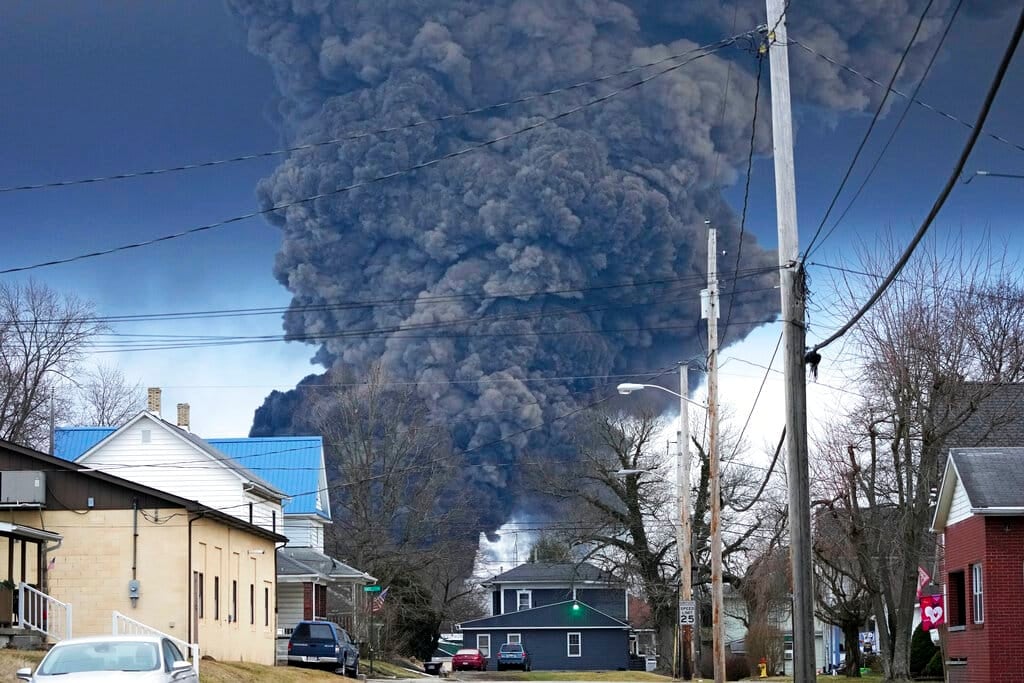Ohio Senators Ready Rail Safety Bill After Fiery Crash

COLUMBUS, Ohio (AP) — Railroads like the one involved in last month’s fiery crash and toxic chemical release in Ohio would be subject to a series of new federal safety regulations and financial consequences under legislation being introduced Wednesday by the state’s two U.S. senators.
An early copy of the Railway Safety Act of 2023, co-sponsored by U.S. Sens. Sherrod Brown and JD Vance, a Democrat and Republican, respectively, and several others of both parties, was obtained by The Associated Press. The bill responds to the fiery derailment of a Norfolk Southern freight train in East Palestine, in northeast Ohio near the Pennsylvania border, on Feb. 3, when 38 cars derailed and more burned.
Though no one was injured or killed, the accident and its aftermath imperiled the entire village and nearby neighborhoods in both states. It prompted an evacuation of about half the town’s 4,000 residents, an ongoing multi-governmental emergency response and lingering worries among villagers of long-term health impacts.
The Senate bill aims to address several key regulatory questions that have arisen from the disaster, including why the state of Ohio was not made aware the hazardous load was coming through and why the crew didn’t learn sooner of an impending equipment malfunction.
“Through this legislation, Congress has a real opportunity to ensure that what happened in East Palestine will never happen again,” Vance said in a statement. “We owe every American the peace of mind that their community is protected from a catastrophe of this kind.”
All trains carrying hazardous materials, including those that don’t fall under existing regulations for high-hazard flammable loads, would face new requirements under the bill. Rail carriers would need to create emergency response plans, and provide information and advance notification to the emergency response commissions of each state a train passes through.
That provision could mean changes across the industry. Hazardous materials shipments account for 7% to 8% of the roughly 30 million shipments railroads deliver across the U.S. each year. But almost any train – aside from a grain or coal train that carries a single commodity — might carry one or two cars of hazardous materials, because railroads often mix all kinds of shipments together on a train.
The Association of American Railroads trade group says 99.9% of hazardous materials shipments reach their destinations safely, and railroads are generally regarded as the safest option to transport dangerous chemicals across land. Still, the East Palestine accident showed how even one derailment involving hazardous materials can be devastating.
Railroad worker unions argue that operational changes and widespread job cuts across the industry in the past six years have made railroads riskier. They say employees are spread thin after nearly one-third of all rail jobs were eliminated and train crews, in particular, deal with fatigue because they are on call 24/7.
The bill would address that issue by setting train crews at a two-person minimum. The provision isn’t specifically in response to East Palestine — where the train had three crew members — but to an industry trend toward one-person crews. The Federal Railroad Administration was already considering a rule that would require two-person crews, in most instances. That rule was proposed last summer, but the agency is still reviewing thousands of comments it received on it.
Brown said it shouldn’t take a massive railroad disaster for elected officials to work across party lines for their communities.
“Rail lobbyists have fought for years to protect their profits at the expense of communities like East Palestine and Steubenville and Sandusky,” he said in a statement. “These commonsense bipartisan safety measures will finally hold big railroad companies accountable, make our railroads and the towns along them safer, and prevent future tragedies, so no community has to suffer like East Palestine again.”
Under the plan, the U.S. Department of Transportation would be required to revisit rules on train size and weight, and to work to prevent railroad delays from causing trains carrying hazardous loads to block rail crossings. That’s as train lengths have grown to 2 miles (about 3 kilometers) or more, as railroads streamline operations to reduce their numbers of crews, mechanics and locomotives.
Unions argue the longer trains are more prone to problems, including breaking apart in the middle of a trip, and these monster trains also can clog rail lines, because they may extend farther than the current sidings for pulling off the main tracks.
Brown, Vance and the bill’s other early co-sponsors — who include Democrats Robert Casey Jr. and John Fetterman, of Pennsylvania, and Republicans Marco Rubio, of Florida, and Josh Hawley, of Missouri — also would increase the maximum fine that the U.S. Department of Transportation can impose for safety violations. It would raise it from $225,000 to up to 1% of a railroad’s annual operating income, which could run into the tens of millions of dollars.
In addition, the bill requires long-haul railroads to pay for hazardous-materials training for local first responders, including police and EMTs, through an increase in their hazmat registration fees.
The National Transportation Safety Board determined the crew involved in the East Palestine accident was alerted by a device designed to detect overheating bearings, but not soon enough to prevent the crash. Even as federal rail regulators urged rail operators Tuesday to reexamine their practices for operating and maintaining such detectors, the Senate proposal would make them more prevalent.
The bill would set nationwide requirements for installing, maintaining and placing the devices — designed to automatically detect wheel bearing and other mechanical issues — and mandate that they scan trains carrying hazardous materials every 10 miles (16 kilometers), twice as often as the East Palestine train was being scanned. No federal requirements exist now for wayside detectors, though the sensors are widespread in the freight rail industry. Currently, railroads are left to decide where to place those detectors and what temperatures should trigger action when an overheating bearing is detected.
The Federal Railroad Administration would be required under the bill to update inspection regulations to assure rail cars carrying hazardous materials receive regular checks by trained mechanical experts. Railcar inspectors previously had about two minutes to inspect every railcar, but now they only get about 30 to 45 seconds to check each car, unions say. And signalmen who maintain signals and warnings at rail crossings have bigger territories to cover, making it harder to keep up with preventative maintenance.
Democratic U.S. Reps. Chris Deluzio, of Pennsylvania, and Ro Khanna, of California, introduced separate rail safety bill in response to the East Palestine derailment in the Republican-controlled House on Tuesday. Its goal is to ensure that trains carrying hazardous materials are properly classified and required to take the corresponding safety precautions.
___
AP Business Writer Josh Funk in Omaha, Neb., contributed to this report.























